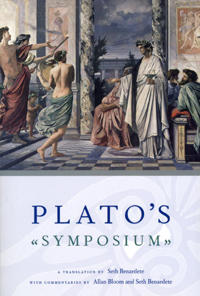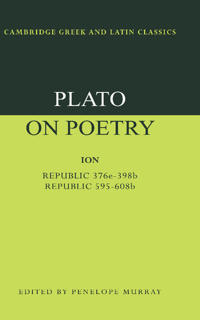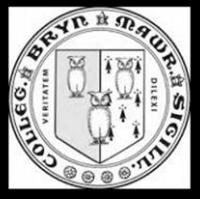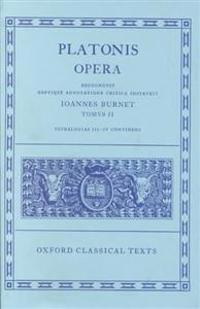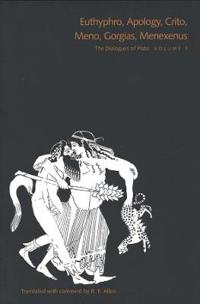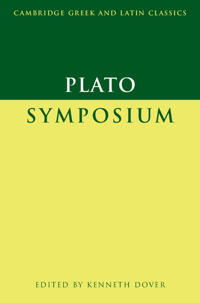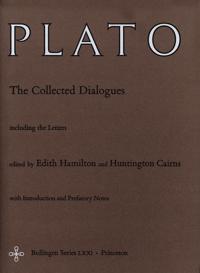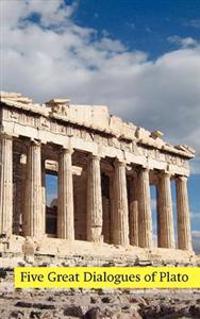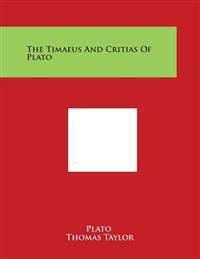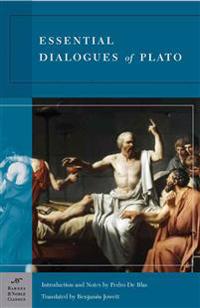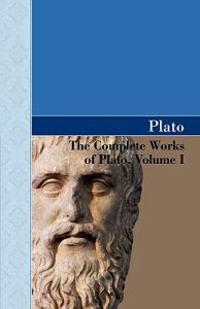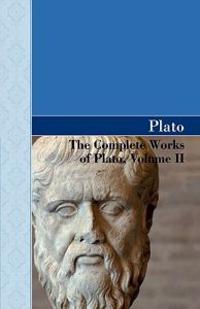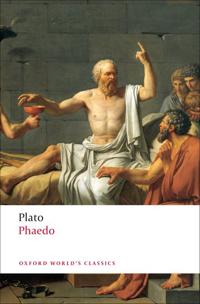Plato's Symposium (Pocket)
avPlato, Seth Benardete, Plato
ISBN: 9780226042756 - UTGIVEN: 200102Plato's "Symposium" - translated here, and with a commentary - is arguably one of the greatest works on the nature of love ever written. It recounts a drinking party following an evening meal, where the guests include Aristophanes, Alcibiades and Socrates. The revellers discuss a variety of topics.[...]
Plato on Poetry (Pocket)
avPlato, Penelope (EDT) Murray, Plato
ISBN: 9780521349819 - UTGIVEN: 1996-03Much has been written in recent years on Plato as a critic of literature, but no commentaries have appeared in English on the Ion, or the opening books of the Republic in which Plato launches his famous attack on poetry, since the early years of this century. This volume brings together these texts [...]
Plato Opera (Inbunden)
avPlato
ISBN: 9780198145417 - UTGIVEN: 1963-03(Par., Phil., Symp., Phdr.; Alc. I, II, Hipp., Am.) Edited by J. Burnet.
Plato's Theory of Knowledge (Pocket)
avPlato, Francis MacDonald (TRN) Cornford, Francis MacDonald Cornford
ISBN: 9780486427638 - UTGIVEN: 2003-04Translated by the noted classical scholar Francis M. Cornford, this edition of two masterpieces of Plato's later period features extensive ongoing commentaries by Cornford that provide helpful background information and valuable insights. The "Theatetus offers a systematic treatment of the question,[...]
Symposium of Plato (Övrig)
avPlato
ISBN: 9780520066953 - UTGIVEN: 1993-05-24A superb example of the bookmaker's and translator's art, this new edition of Plato's Symposium exhibits aesthetic, literary, and intellectual excellences rarely found together in a single volume. Tom Griffith's translation of this foundation work of Western culture is unsurpassed for the balance i[...]
Plato: Symposium (Häftad)
avPlato
ISBN: 9780521295239 - UTGIVEN: 198002Plato's Symposium is the most literary of all his works and one which all students of classics are likely to want to read whether or not they are studying Plato's philosophy. But the reader does need help in appreciating both the artistry and the arguments, and in comprehending the social and cultur[...]
Plato: The Republic (Pocket)
avPlato
ISBN: 9780521484435 - UTGIVEN: 2000-09-25Presents the most important of the Socratic dialogues as if it were a conversation; deals with the creation of an ideal commonwealth and ranks as one of the earliest Utopian works.[...]
Plato: Phaedrus (Pocket)
avPlato
ISBN: 9780521612593 - UTGIVEN: 2011-05-26Provides all the tools necessary to read and understand Plato's Phaedrus in the original Greek.
The Dialogues of Plato (Pocket)
avPlato
ISBN: 9780553213713 - UTGIVEN: 1994-10"The unexamined life is not worth living." Socrates's ancient words are still true, and the ideas sounded in Plato's Dialogues still form the foundation of a thinking person's education. This superb collection contains excellent contemporary translations selected for their clarity and accessibil[...]
Plato (Inbunden)
avPlato
ISBN: 9780674992214 - UTGIVEN: 1927-06Plato, the great philosopher of Athens, was born in 427 BCE. In early manhood an admirer of Socrates, he later founded the famous school of philosophy in the grove Academus. Much else recorded of his life is uncertain; that he left Athens for a time after Socrates' execution is probable; that later [...]
The Collected Dialogues of Plato (Inbunden)
avPlato
ISBN: 9780691097183 - UTGIVEN: 196110Presents outstanding translations of the Greek philosopher's works by leading British and American scholars of the last century[...]
Five Great Dialogues of Plato: Euthyphro, Apology, Crito, Meno, Phaedo (Häftad)
avPlato
ISBN: 9780982129821 - UTGIVEN: 200907The Laws of Plato (Pocket)
avPlato
ISBN: 9781108060684 - UTGIVEN: 2013-06-27A two-volume 1921 edition of Plato's last dialogue, comprising a short introduction, the Greek text, analyses and extensive notes.[...]
The Laws of Plato: Edited with an Introduction, Notes Etc. (Pocket)
avPlato
ISBN: 9781108060691 - UTGIVEN: 2013-06-27A two-volume 1921 edition of Plato's last dialogue, comprising a short introduction, the Greek text, analyses and extensive notes.[...]
The Laws Of Plato 2 Volume Set (Pocket)
avPlato
ISBN: 9781108060707 - UTGIVEN: 2012-12-05A two-volume 1921 edition of Plato's last dialogue, comprising a short introduction, the Greek text, analyses and extensive notes.[...]
The Timaeus and Critias of Plato (Häftad)
avPlato, Thomas Taylor
ISBN: 9781497986831 - UTGIVEN: 2014-03Essential Dialogues of Plato (Häftad)
avPlato
ISBN: 9781593082697 - UTGIVEN: 2013-03"Essential Dialogues of Plato," by Plato, is part of the "Barnes & Noble Classics"" "series, which offers quality editions at affordable prices to the student and the general reader, including new scholarship, thoughtful design, and pages of carefully crafted extras. Here are some of the remarkable [...]
Republic (Pocket)
avPlato, Christopher (TRN) Rowe, Plato
ISBN: 9780141442433 - UTGIVEN: 2012-12This is an authoritative new translation of Plato's "The Republic" by Christopher Rowe, with notes and an introduction. 'We set about founding the best city we could, because we could be confident that if it was good we would find justice in it'. "The Republic", Plato's masterwork, was first enjoyed[...]
Phaedo (Pocket)
avPlato, David Gallop, Plato
ISBN: 9780199538935 - UTGIVEN: 200904The Phaedo is acknowledged to be one of Plato's greatest masterpieces, showing him both as a philosopher and as a dramatist at the height of his powers. For its moving account of the execution of Socrates, the Phaedo ranks among the supreme literary achievements of antiquity. It is also a seminal do[...]

